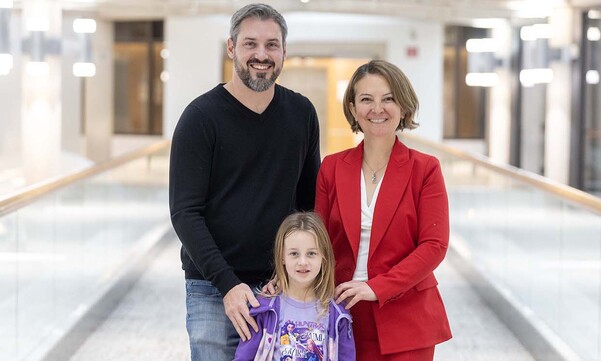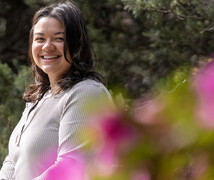Anthony Becke thought he had a pebble in his shoe. Turned out, it was stage 3 melanoma. After being told amputation was his only recourse, Becke turned to Duke where he was told, "We don't do that here." Becke underwent a special type of chemotherapy. Five years later, he remains cancer free.
Anthony Becke felt as if he had a pebble under his foot. He took off his shoe, shook it, but nothing came out. A couple of days later, during a walk with his wife, he concluded it could be a splinter that was bothering him. His job as a golf pro kept him on his feet, and he kept noticing a slight pain in his right heel, and soon a growth appeared.
By Thanksgiving 2008, his primary care physician sent him to a podiatrist who thought a plantar wart might be developing. He removed tissue, but didn’t find any cause for the growth.
The next month Becke traveled with his family to Disney World. With his foot bandaged, he walked great distances in the amusement parks. By the second day, his foot was bleeding. He returned to the podiatrist, who sent him to a wound clinic for care. He was given a cream that had no effect on his increasingly painful foot, and he soon consulted other physicians.
Eventually Becke learned that the pain in his foot was from stage 3 melanoma, and that the cancer had spread into lymph nodes in his groin.
Then he received more bad news: he might need amputation.
Becke was crushed. His sister had given him a book for people with cancer and he re-read it, trying to come to terms with the most recent news. One section of the book leapt out at him. “It said, ‘No matter what, get another opinion,’” Becke says.
His doctor gave him the name of a melanoma expert at the Duke Cancer Center. When Becke asked about amputation, the Duke cancer specialist replied, "“we don’t do that here.”
“My wife and I both started crying,” Becke says. “I almost tried to argue with him."
Becke's Duke team used a technique called regional chemotherapy, which is also referred to as isolated limb perfusion. A tourniquet isolated Becke’s leg from thigh to toes so the chemotherapy drug, delivered at a high dose, would stay in the leg only and not affect the rest of his body with typical chemotherapy effects like nausea or hair loss.
The tumor died and was completely removed, along with affected lymph nodes. Now Becke is living without cancer. He can walk 18 holes, stay active in his golf pro job, and work at his family restaurant, the Whispering Pines Café in Whispering Pines, NC.
He says he would tell everyone: listen to your body and get it checked out if you think there is something wrong. “Be adamant about getting a second opinion,” he adds. “Going to Duke Cancer Center for another opinion saved my life. I am the biggest cheerleader on this planet.”





